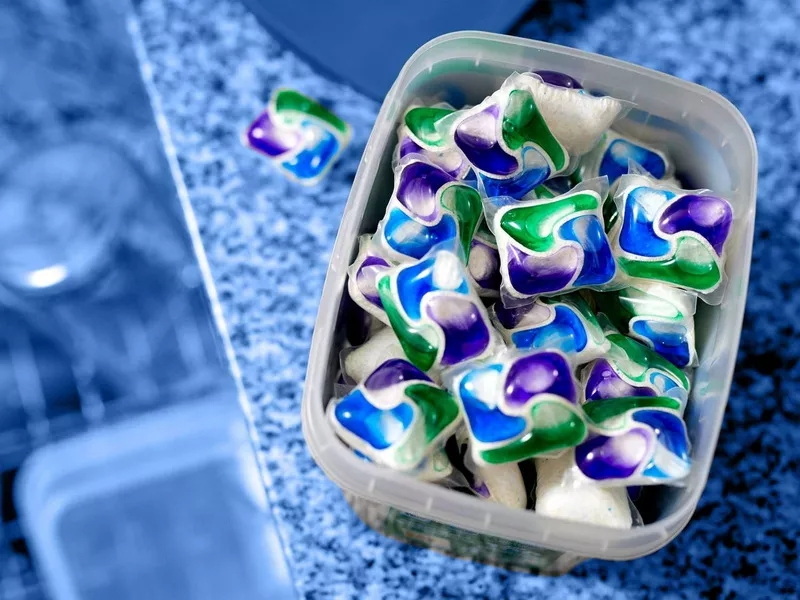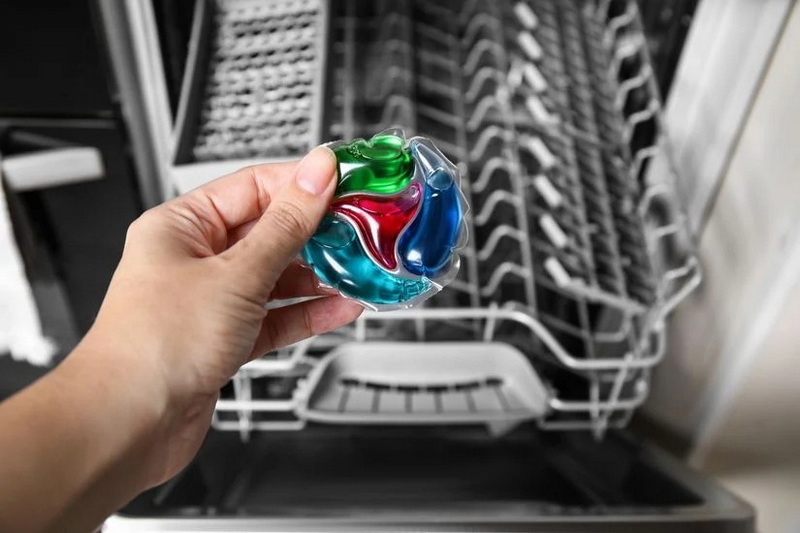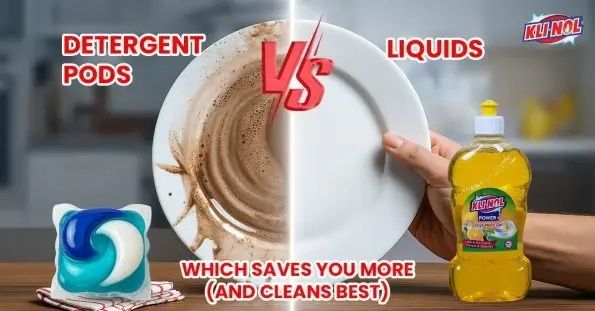Dongguan UFine Daily Chemical Co.,Ltd.
- All
- Product Name
- Product Keyword
- Product Model
- Product Summary
- Product Description
- Multi Field Search
Views: 222 Author: Tomorrow Publish Time: 11-14-2025 Origin: Site











Content Menu
● Understanding Dishwasher Pods and Laundry Detergent
● The Key Differences in Formulation
● Why Some People Consider Using Dishwasher Pods for Laundry
● Potential Risks and Outcomes
>> Impact on Your Washing Machine
>> Personal and Environmental Safety Concerns
● Expert Guidance and Manufacturer Recommendations
● What to Do If You've Used a Dishwasher Pod by Mistake
● Safe Laundry Alternatives in Emergencies
● FAQ
>> 1. Can dishwasher pods damage my washing machine?
>> 2. What should I do if I already used a dishwasher pod in my laundry?
>> 3. Are dishwasher pods toxic to humans if used in laundry?
>> 4. Is there any emergency alternative to laundry detergent?
>> 5. Will my clothes come out cleaner if I use a dishwasher pod?
Curiosity or necessity sometimes leads people to household cleaning experiments, such as considering whether dishwasher pods can be used as substitutes for laundry detergent. The convenience and powerful cleaning agents in dishwasher pods might seem appealing, especially when laundry detergent runs out. But can dishwasher pods be used in the laundry safely and effectively? This comprehensive article explores the risks, chemistry, possible consequences, and expert recommendations related to this question.
In everyday households, quick fixes and hacks spread rapidly through word of mouth and online channels. The idea of repurposing common products for unintended uses is appealing because it promises saving time and money. However, portioning out the science behind why products are formulated a certain way reveals a more nuanced reality. The purpose of this article is not to shame experimentation but to provide clear, evidence-based guidance to help readers make informed decisions. By examining product formulations, machine design, fabric care science, and safety considerations, it becomes possible to weigh the potential benefits against the risks.
This discussion also highlights how manufacturers view cross-usage scenarios. Most reputable brands publish explicit warnings against using products outside their intended purpose, which is an important signal about safety and performance. While curiosity can drive innovation in how households approach cleaning, the laundry and dishwashing environments are designed with different chemical ecosystems in mind. Understanding these distinctions helps prevent unintended consequences, from damaged fabrics to compromised appliances and skin irritation.

Dishwasher pods are pre-measured capsules containing concentrated detergent, surfactants, enzymes, and sometimes rinse aids. They are formulated for dishwashers and designed to remove food particles, grease, and stains from glassware, plates, and utensils during a rinse and wash cycle at high water temperatures. The pod's packaging and the solid core ensure a controlled release of cleaning agents when it meets hot water, which enhances dissolution and reduces handling mess.
The typical detergent cocktail in dishwasher pods includes surfactants with strong grease-cutting properties, alkaline builders to soften water, bleaching agents or peroxide in some formulas for additional stain removal, and enzymes that help break down starches and proteins present in food residues. Some formulations also incorporate rinse aids to improve drying and prevent water spots on dishes. The packaging is designed to withstand the wet environment of a dishwasher while delivering a precise dose.
Laundry detergent is a cleaning product created to eliminate dirt, odors, and stains from fabrics. It typically contains surfactants, enzymes, builders, and sometimes optical brighteners or fragrance. These ingredients target various stains and work effectively in both hot and cold water cycles, while remaining safe for textiles and skin.
Laundry detergents are formulated to be gentle on fabrics yet effective at removing everyday soils. They may include specific enzymes geared toward protein-based stains (like sweat or grass), and others targeting starches or fats. The pH of laundry detergents is balanced to protect fabric fibers and reduce irritation for skin contact. Many detergents also incorporate fabric-softening agents, which help with ease of ironing and feel of textiles after washing.
Although both types of pods clean, they are not interchangeable. The core differences include:
- Chemical Composition: Dishwasher pods rely more heavily on powerful degreasers, bleach, and water softeners unsuitable for fabrics. The detergent matrix is optimized to cut through baked-on food residues and mineral deposits typical in dishwashing scenarios.
- pH Levels: Dishwasher detergent is much more alkaline, which can degrade natural and synthetic fibers over repeated exposure. Laundry detergents are formulated with a pH that maintains textile integrity and minimizes skin irritation.
- Enzyme Targeting: Dishwasher pods focus on breaking down food; laundry detergents often tackle protein, grease, and plant stains specifically from fabric. The enzyme suites are chosen to match the typical soils found on dishes versus clothing.
- Water Solubility: Laundry detergents dissolve easily at a range of water temperatures. Dishwasher pods are made to dissolve quickly but thoroughly at the high temperatures typical of dishwasher cycles. If used in laundry machines, dissolution behavior can vary with temperature and water hardness, leading to uneven cleaning.
Occasionally, people run out of laundry detergent and look for alternatives. Or, they may believe that powerful dishwasher pods could supercharge their laundry routine or help clean extra-dirty clothes.
Common scenarios include:
- Out of laundry detergent unexpectedly, especially in households with irregular shopping patterns or travel.
- Trying to eliminate tough odors or stains with a stronger cleaning agent that seems to be more potent than regular detergent.
- Experimenting with household cleaning hacks found online, influenced by influencer hacks or anecdotal success stories.
It is important to recognize that desperation can cloud judgment. The variables in each laundry load—fabric type, soil level, water hardness, and machine type—mean that a solution that seems to work in one scenario may fail in another.
Using a dishwasher pod in your washing machine can result in several problems:
- Clothing Damage: The harsh chemicals might weaken fabrics, cause discoloration, fading, or even holes in clothing fibers. Repeated exposure can exacerbate wear, reducing garment lifespan.
- Residue: Dishwasher pod formulas can leave a chalky or slippery residue on the material, making clothes uncomfortable to wear. Residues can also attract more lint or hinder dye performance in delicate fabrics.
- Fragrance: Laundry detergents are formulated for skin contact; dishwasher pod residues may irritate skin or cause allergic reactions, especially on sensitive skin or when clothes are worn directly after washing.
Washing machines are designed for laundry detergent, not the abrasive substances in dishwasher pods. Risks include:
- Excessive Sudsing: Dishwasher pods might create too many or too few suds, potentially leading to leakage or inefficient washing cycles. Suds can overflow from top-loaders and cause wear on seals and bearings over time.
- Machine Damage: High alkalinity and bleach can corrode internal washing machine components, particularly plastic or rubber seals. Over time, this can lead to leaks, odor retention, or electronic sensor issues.
- Clogging and Build-Up: Dishwasher pod residue may not dissolve fully, leading to clogs over time in dispensers, jets, or internal channels. This can necessitate professional cleaning or part replacement.
- Toxic Exposure: Dishwasher detergent contains substances not intended for skin or prolonged contact with textiles, raising safety concerns, especially for children or those with sensitive skin. Residues on clothing can transfer to skin, potentially causing irritation.
- Environmental Impact: If not properly rinsed, chemical residues from dishwasher pods are washed into wastewater, which may not be fully filtered in treatment plants—posing threats to aquatic life. The accelerated chemical load can contribute to water hardness and ecosystem disruption.

Industry experts, appliance manufacturers, and brand guidelines almost universally recommend using products as intended:
- Read the Labels: Both dishwasher pod and washing machine manufacturers warn against improper product substitutions. The warnings are backed by safety data and testing protocols that show potential negative outcomes.
- Safety Data: Laundry detergents are regulated for textile and skin safety; dishwasher pods are not designed for fabric care. Following label instructions helps ensure consumer protection.
- No Substitute: In emergencies, it's safer to wash clothes with just water or a tiny amount of household soap than risk using a dishwasher pod. If possible, obtain proper detergent as soon as convenient.
- “Dishwasher pods will get out the toughest stains.” Their formula is not designed for organic fabric stains and can damage clothing.
- “Both products are just detergents, so it's fine.” Chemical formulations, targeted cleaning, and intended surfaces vary widely.
- “One pod in the laundry can't hurt.” Even a single use can cause skin irritation, damage fabrics, or harm your machine, especially if the load is sizeable or includes delicate textiles.
- “Dishwasher pods are more concentrated, so a smaller amount should be safe.” Concentration targets dishwasher cycles and is not appropriate for textile care environments.
- Rinse Thoroughly: Run an additional rinse cycle (or two) to remove as much residue as possible from both fabrics and the machine. Check the dispenser to ensure no remaining pods or fragments are left behind.
- Check for Damage: Look for visible changes to clothing, such as color fading, spots, or weakening fibers. Inspect seams, elastic areas, and printed designs where stress is higher.
- Inspect the Washer: Examine seals and dispensers for residue or damage, and run a machine-cleaning cycle with hot water if needed. Listen for unusual noises or vibrations that could indicate internal damage.
- Watch for Reactions: If you or anyone in your household experiences skin reactions after wearing the washed clothes, rewash them with proper detergent or simply with water. If irritation persists, seek medical advice.
If you have no laundry detergent on hand, consider these safer alternatives:
- Use a small amount of gentle liquid soap (not dish soap, which can also cause excess suds). Choose fragrance-free or hypoallergenic options if sensitive skin is a concern.
- Wash a small load in just warm water for lightly soiled clothes. The mechanical action of washing can help lift soils without adding harsh chemicals.
- Borrow detergent from a neighbor or purchase a travel-size or sample packet. Even a single-use packet can make a difference without risking damage.
Never use dishwasher pods as a substitute for laundry detergent. The risks far outweigh any convenience or anticipated cleaning boost.
So, can dishwasher pods be used in the laundry? The answer remains a clear no. Their powerful chemical compounds, unsuitable surfactants, and extreme alkalinity pose significant risks to fabrics, washing machines, skin, and the environment. Using the correct detergent for each appliance not only ensures safety and optimal cleaning but also protects your investment in clothing and household equipment. If a substitution is considered due to extraordinary circumstances, it is crucial to consult product labels, seek manufacturer guidance, and weigh the potential consequences against the perceived benefit.
Beyond the practical safety concerns, this topic underscores a broader principle: cleaning products are purpose-built tools. The design, testing, and regulatory approvals behind each product reflect a careful balance between effectiveness, fabric compatibility, and user safety. When that balance is disrupted, the predictable outcomes—fabric damage, machine wear, skin irritation, and environmental impact—often follow. Maintaining adherence to product use instructions is a simple but powerful way to protect health, belongings, and the environment.

Yes. Dishwasher pods contain highly caustic agents and bleach that can corrode rubber, plastic, and metal parts inside washing machines, potentially leading to leaks or expensive repairs.
Immediately run one or more additional rinse cycles to wash out any detergent residue from your clothes and the machine. Inspect for visible damage and monitor for any skin irritation after wearing the clothes.
They can be. Dishwasher pods include chemicals for food residue removal that are not meant for skin contact and could cause allergies, rashes, or other reactions when left on clothing.
If you have no laundry detergent, wash small loads in warm water only, or use a minimal amount of mild liquid soap. Never use dish soap or dishwasher pods in your laundry machine.
No. Dishwasher pods are formulated to break down food particles, not textile stains, and may leave residue or damage fabric instead of improving cleanliness.